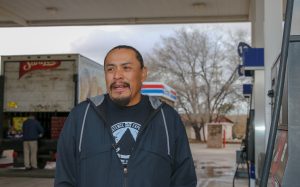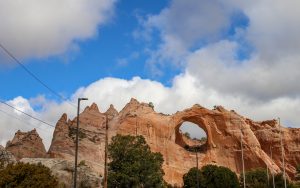- Slug: BC-CNS Navajo Impeachment, 1,010 words.
- 3 photos and captions below.
- Video by Jordan Elder here.
By Chelsea Hofmann
Cronkite News
WINDOW ROCK – The Navajo Nation Reservation spans 27,000 square miles across parts of Arizona, Utah and New Mexico. The land, with its deep canyons, towering spires and wide mesas, is just as diverse as the more than 156,000 people who call it home. Life and news here move at a different pace.
“There is a digital divide on the Navajo Nation where some people might have access to cable TV, but a lot of people still use the radio, especially people of a different generation,” said Michael Lerma, the dean of the School of Business at the Tsaile campus of Diné College.
This divide plays out when it comes to the story that has dominated national headlines for weeks now – the impeachment hearings into President Donald Trump and the question of whether he abused the power of the presidency in his dealings with Ukraine. On the heels of the House Judiciary Committee hearing, Speaker of the House Nancy Pelosi on Thursday called on Democratic leadership to draft articles of impeachment.
Cronkite News recently went to Window Rock, capital of the Navajo Nation, to see what Navajos are saying about impeachment. At a gas station on the edge of town, we spoke to more than a dozen people.
“They should just impeach him, you know, far too long people get in the way,” said Ralphus Begay, who works as a driver. “It’s not right. Whatever is happening, it’s not right, you know? History repeating itself is all I can say about it.”
Many presidents have faced impeachment threats, but only Andrew Johnson in 1868 and Bill Clinton in 1998 have been impeached by the House, and neither was convicted in the Senate. Richard Nixon resigned in 1974 before the full House impeached him.
Others at the gas station were more supportive of Trump, who denies any wrongdoing and has refused to cooperate with the House investigation, which he calls a sham.
“I hope he gets out of it,” Rickey Crawford said. “I hope they have the right lawyers for him. I hope he’s doing OK about it himself, because if I was in that situation, I would be lost, and I wouldn’t know what to do.”
Jourdan Bennett-Begaye, who’s Navajo, is reporting on the impeachment hearings from Washington, D.C., for Indian Country Today. She said she asked her audience in a tweet whether they would be watching the impeachment hearings.
“Some people just don’t want to (watch) because it’s too much politics for them,” Bennett-Begaye said. “But then again, a lot of Native people say like, their lives are political anyway, so they’re watching.”
Tionne Talimen, who owns a hair salon in Window Rock, said she follows the news closely.
“I’m not going to judge anything until they have everything they have,” she said. “So I’m real curious” to see if anything new develops.
“Sit back and do your research,” Talimen said. “Don’t judge too quickly… It’s always best to hear everything out on the table before judging.”
Seventy-eight percent of U.S. households report having internet subscriptions, according to 2017 census data, but the Navajo reservation and other remote areas have significantly lower figures. Nationally, more than 20% of Americans 65 or older report having no computer in their home.
Radio stations in Navajoland – including bilingual KTNN, which broadcasts on AM and FM frequencies – bring the news to households without cable TV or internet.
“The Navajo Nation has regarded KTNN radio as their main source for information, and in many cases, the only source for information that affects them personally,” the station’s website says.
Navajo Nation President Jonathan Nez said younger people on the reservation seek their news through social media, while elders who don’t read English get most of their news from newspapers and radio.
“For those of us that are in the middle between the elderly,” he said, “we get our news from, you know, TV and satellite, and then for our elders, they get it from radio. And especially when in our own language, we have our radio stations that explain what we’re doing in the Navajo language to our Navajo elders.”
Some Navajos who spoke to Cronkite News declined to share their opinions, saying they worry about repercussions in America’s deeply divided political atmosphere.
Lerma, the Diné College business dean, has a doctorate in American Indian studies and taught politics and international affairs at Northern Arizona University. A member of the Purépecha Tribe in Mexico, he’s married to a citizen of the Navajo Nation. Lerma said his grandmother introduced him to politics when he was 3 or 4 years old, and he remembers watching Clinton’s impeachment proceedings.
Lerma said there are diverse opinions among the Navajo Nation, and it’s important to understand how overlapping identities can impact a tribal member’s position in politics.
“We really don’t know where people land in all these things, but it just gets ever more complex because of the overlapping identities,” Lerma said. “Are you American? Are you Navajo? Are you both? So that’s the reality.”
Lerma said the traditional Navajo cultural perspectives do not always align with someone’s political beliefs. For example, someone can be conservative, but that may not “necessarily represent the interest that would actually benefit your family and your marriage.”
Nez, who declined to talk about the impeachment proceedings, wants the Navajo Nation to be taken seriously during the 2020 election.
“Being the biggest tribe, I invite all the presidential candidates to come to the Navajo Nation and to see the conditions and the hope that we have, and working together I think we can accomplish a lot.”
But for Bennett- Begaye, she’s focused on the impeachment proceedings, even if tribal leaders have reservations about commenting.
“A lot of tribal leaders like oftentimes say Native issues aren’t bipartisan, they’re nonpartisan, and they have to work with both sides of the aisle,” Bennett-Begaye said. “So, I mean, it’s kind of sad to see that they don’t want to, you know, participate in this in some form or fashion.”
Video by Jordan Elder/Cronkite News
For more stories from Cronkite News, visit cronkitenews.azpbs.org.
^_=


